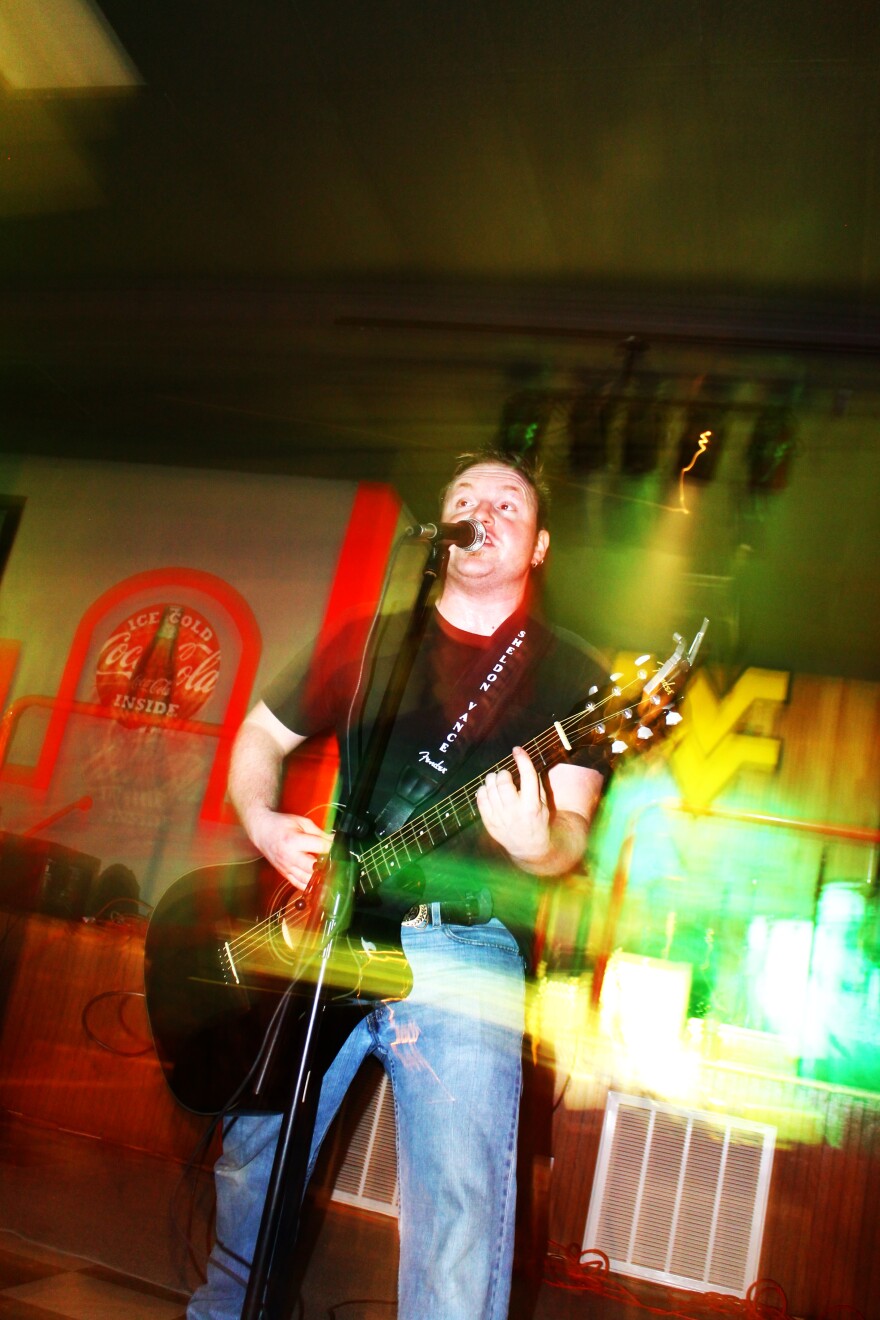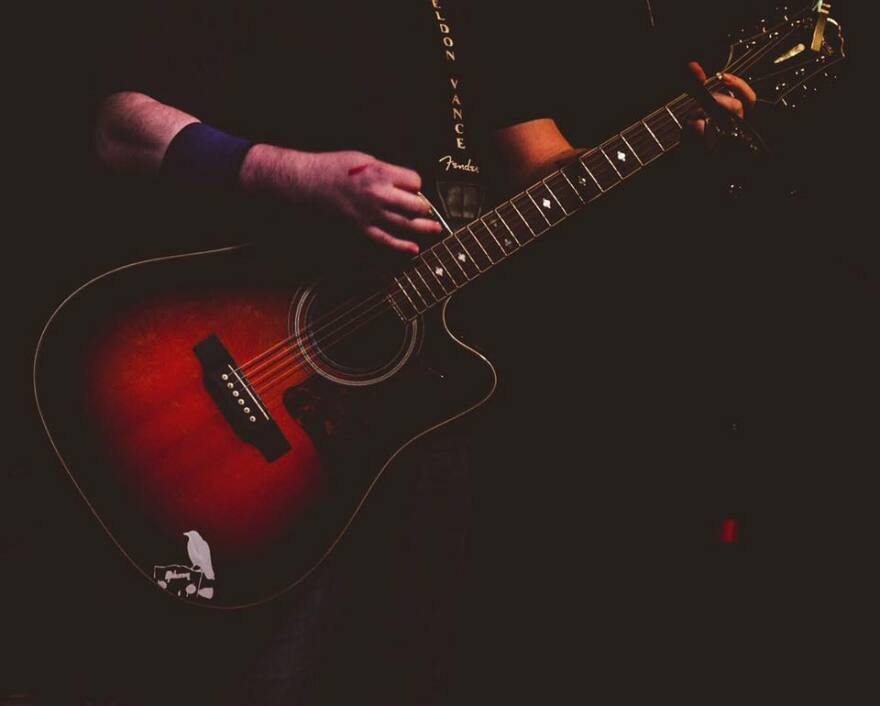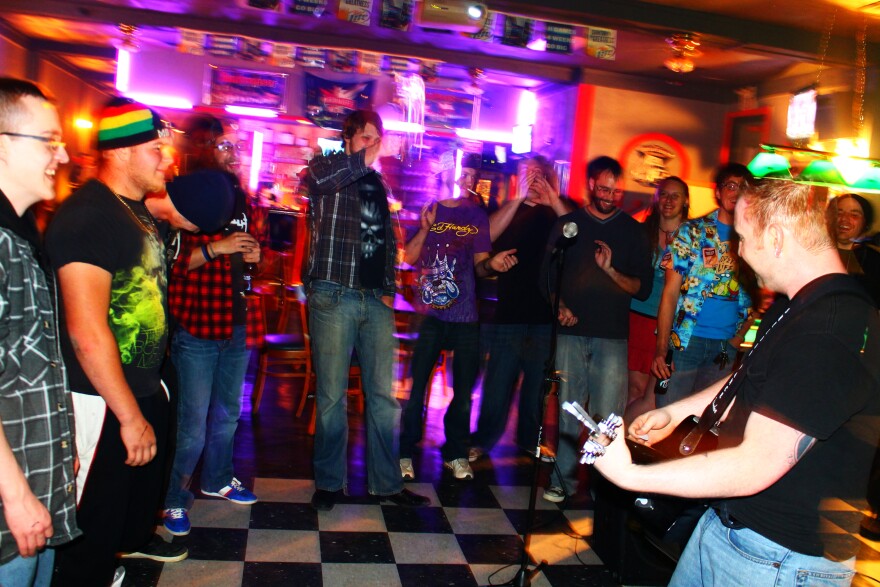From West Virginia Public Broadcasting and A Change of Tune, this is 30 Days of #WVmusic, the interview series celebrating the folks who make the West Virginia music scene wild and wonderful.
And today’s interview is with an Appalachian acoustic punk rocker who isn’t afraid to sing about hills, pills and unpaid bills. This… is Sheldon Vance.
<a data-cke-saved-href=”http://sheldonvance.bandcamp.com/album/northbound” href=”http://sheldonvance.bandcamp.com/album/northbound”>Northbound by Sheldon Vance</a>
How did you start playing music?
I started playing solo after almost a decade’s hiatus from music. I spent almost all of my teens and twenties traveling around the country with my old band on DIY tours. When that fell apart, I became disheartened and all but gave up.
But there was an ember that would never die. My wife bought me an acoustic guitar and all but shoved it into my hands. Then a lifetime’s worth of influences and experiences started to come out in song in a way they never did when I was in a band with an amp blasting behind me.
Songs started pouring out, and for the first time in my life, I was writing songs and lyrics that I was truly proud of and knew meant something. And without any intention of going for a particular sound, the music I heard growing up was showing itself in these new songs, including the Appalachian music, gospel, old country and bluegrass that my parents played on the stereo and my dad walked around singing.
I’m not sane or healthy if I’m not playing music; I found that out the hard way. I have to play in order to have a healthy, happy life. I have to have my voice, and songwriting gives me that.
Why did you use your own name to play and perform music?
I tried using a band name or stage name because I was afraid of people thinking I was egotistical. I just couldn’t get past thinking it would be weird to have my given name on shirts and such. But using stage monikers just confused people and muddied things up. So after some prompting from friends and family, I started using my own name.
How has your sound changed over time (if at all)?
I went from full-on, fast, hardcore punk to playing acoustic. It seemed like a big shift, and it was, but I still incorporate some of that energy and spirit into my stage performance even now. I’ve had to learn to embrace the subtleties and differences and not approach everything like I used to in a band. This is a different beast, with its own beauty and merit. I have to let it be what it is and get out of the way sometimes and let the songs and their spirit shine through.
What’s been the highlight of your musical journey thus far?
It’s not any particular show, but the highlight for me is when people started singing my songs back to me on stage. Especially at the all-ages shows, the young kids have so much heart and energy, and they’re there for nothing more than the music. I’d walk away from the mic and down off the stage, singing right into their faces, and they’re singing right back… I’m smiling, and they are too.
I put every fiber of my being into my songs, and they’re a part of me. And to have someone think enough of something you created that they would remember the words, then for the crowd to shout them back to you? I’ll take that to my grave. That means something.
What’s it like making music in West Virginia?
There’s plenty to write about growing up here. I came from Logan County, and hard times were the name of the game. I think those experiences are common here and around the country like any human experience. But locally, there’s little subtle things that us West Virginia musicians pick up on and can rally around. It’s an honest common thread.
Do you feel held back by being in West Virginia? Or does it feel like a musically-supportive place?
There are a ton of roads that lead out of the state if you want to grow your music elsewhere. But it’s a good home base. I’ve never felt like living here specifically held me back; I’m the only one guilty of holding me back.
When me and my friends were younger, there were no bands coming to West Virginia we wanted to see, and we couldn’t get into bars. Instead of crying about it, we put on our own shows. We rented out school gyms, unions halls and community centers, and we booked bands and did our thing. You can’t use where you live as an excuse as to why nothing is happening. Make it happen. You can do it. I’ve seen it done.
There aren’t a ton of venues, but that makes for a more tight-knit scene. You get lost in the mix in bigger cities, and I’ve experienced that firsthand. When you come from a small town like I did, you appreciate the hell out of the bands who come to play on Saturday night. In bigger markets, they have bands playing all the time, and they get jaded.
What, in your opinion, needs to happen in the West Virginia music scene for it to move forward?
Maybe just a touch more unity. It’s getting better, and artists do support one another for the most part. But I do feel like there are folks who hold back on showing the love a little. I think they’re afraid people will confuse their showing support as deferring to someone. But as it stands, I see things moving in a really positive direction more than it ever has.
What’s your advice to anyone starting to make music?
Write honest, real songs. Write about what you know. Mean what you say. Be humble, kind and gracious. Play each show like it might be your last because it very well could.
Sheldon Vance’s latest release is Northbound. Keep an eye (and ear) on his social media for tour dates and new releases. Hear more #WVmusic on A Change of Tune, airing Saturday nights at 10 on West Virginia Public Broadcasting. Connect with A Change of Tune on Facebook, Twitter and Instagram. And for more #WVmusic chats, make sure to go to wvpublic.org/wvmusic and subscribe to our RSS / podcast feeds.
Support for 30 Days of #WVmusic is provided by Kin Ship Goods, proud supporter of DIY music and the arts. Locally shipped worldwide at kinshipgoods.com.























